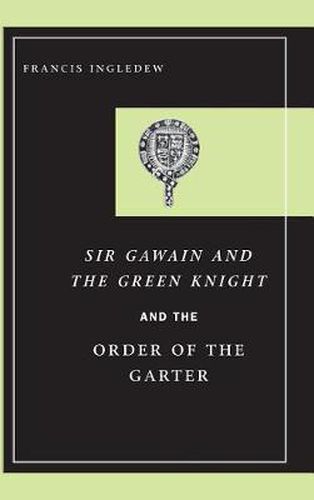Readings Newsletter
Become a Readings Member to make your shopping experience even easier.
Sign in or sign up for free!
You’re not far away from qualifying for FREE standard shipping within Australia
You’ve qualified for FREE standard shipping within Australia
The cart is loading…






This title is printed to order. This book may have been self-published. If so, we cannot guarantee the quality of the content. In the main most books will have gone through the editing process however some may not. We therefore suggest that you be aware of this before ordering this book. If in doubt check either the author or publisher’s details as we are unable to accept any returns unless they are faulty. Please contact us if you have any questions.
Francis Ingledew’s book makes the case that Sir Gawain and the Green Knight, one of the canonical works of medieval English literature, should be recognized as a response to King Edward III’s foundation in 1349 of the chivalric Order of the Garter. As well as providing the basis for a thorough reinterpretation of the poem’s purposes and meanings, this argument dates to the mid-fourteenth-century reign of Edward III (1327-77) a poem conventionally ascribed to the reign of Richard II (1377-99).
Through close readings of the poem and of an array of overlooked historical sources, Ingledew presents Sir Gawain and the Green Knight as a critique of Edward III’s sexual and military behavior. Ingledew’s argument takes him deep into chivalric practice in Edward’s court of the 1340s, much of it connected with the early years of war with France. Ingledew pursues the significance of sexual scandal associated with Edward, especially the rape of the Countess of Salisbury confidently imputed to him by the formidable Liegois historian Jean le Bel. At the same time that he was trying to conquer France and Scotland and preside over a court vulnerable to scandal, Edward also called on the history (as it was seen) of King Arthur and the Round Table, associating himself with Arthur’s imperial and moral authority through the founding of the Order of the Garter. In its portrayal of the Order of the Garter, Ingledew argues, Sir Gawain and the Green Knight sets itself at odds with Edward’s central ethical and political projects.
A new and persuasive interpretation of a central literary text, this book will be of interest to medievalist historians as well as literary scholars.
$9.00 standard shipping within Australia
FREE standard shipping within Australia for orders over $100.00
Express & International shipping calculated at checkout
Stock availability can be subject to change without notice. We recommend calling the shop or contacting our online team to check availability of low stock items. Please see our Shopping Online page for more details.
This title is printed to order. This book may have been self-published. If so, we cannot guarantee the quality of the content. In the main most books will have gone through the editing process however some may not. We therefore suggest that you be aware of this before ordering this book. If in doubt check either the author or publisher’s details as we are unable to accept any returns unless they are faulty. Please contact us if you have any questions.
Francis Ingledew’s book makes the case that Sir Gawain and the Green Knight, one of the canonical works of medieval English literature, should be recognized as a response to King Edward III’s foundation in 1349 of the chivalric Order of the Garter. As well as providing the basis for a thorough reinterpretation of the poem’s purposes and meanings, this argument dates to the mid-fourteenth-century reign of Edward III (1327-77) a poem conventionally ascribed to the reign of Richard II (1377-99).
Through close readings of the poem and of an array of overlooked historical sources, Ingledew presents Sir Gawain and the Green Knight as a critique of Edward III’s sexual and military behavior. Ingledew’s argument takes him deep into chivalric practice in Edward’s court of the 1340s, much of it connected with the early years of war with France. Ingledew pursues the significance of sexual scandal associated with Edward, especially the rape of the Countess of Salisbury confidently imputed to him by the formidable Liegois historian Jean le Bel. At the same time that he was trying to conquer France and Scotland and preside over a court vulnerable to scandal, Edward also called on the history (as it was seen) of King Arthur and the Round Table, associating himself with Arthur’s imperial and moral authority through the founding of the Order of the Garter. In its portrayal of the Order of the Garter, Ingledew argues, Sir Gawain and the Green Knight sets itself at odds with Edward’s central ethical and political projects.
A new and persuasive interpretation of a central literary text, this book will be of interest to medievalist historians as well as literary scholars.